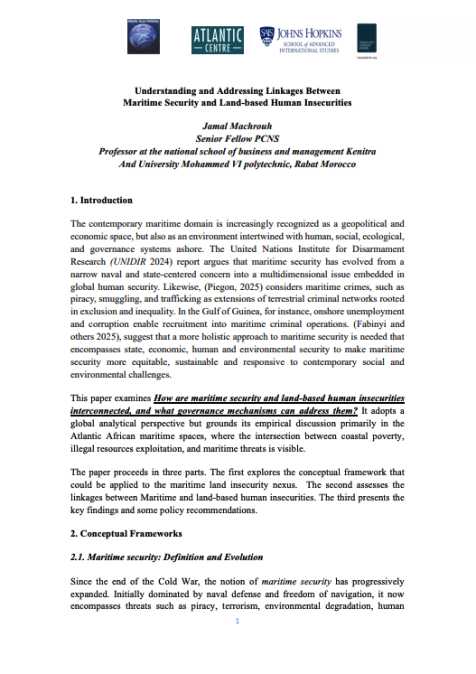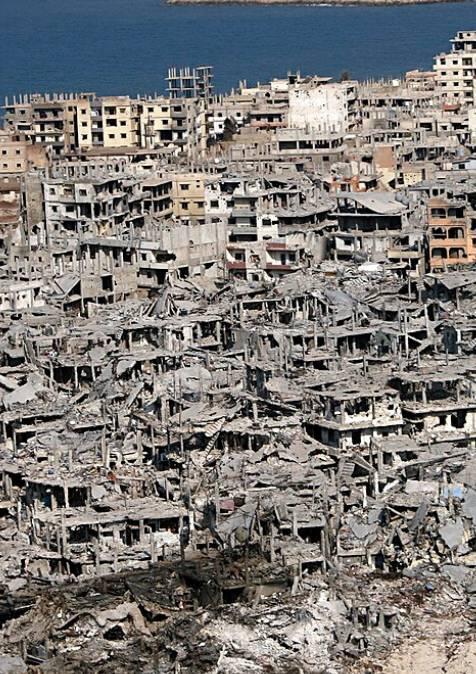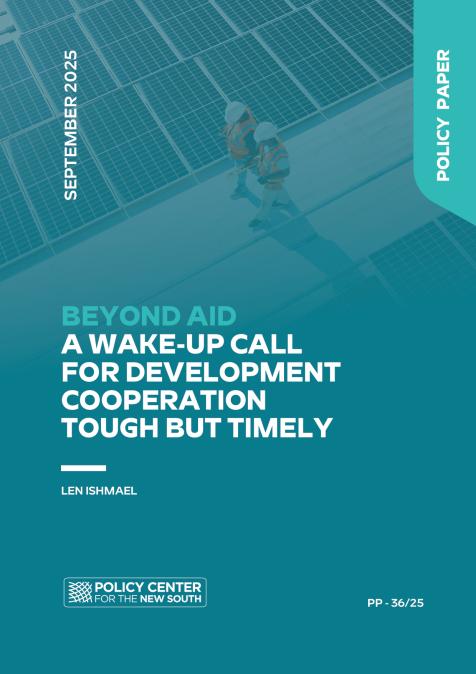In this interview with François Reybet-Degat, we explore the complex challenges and strategies involved in managing and mitigating refugee situations, especially in conflict-affected areas. We discuss how various regions, including both state and non-state actors, respond to the influx of refugees, taking into account political, economic, and social factors. The conversation also covers international cooperation, humanitarian aid, and policy frameworks designed to offer support and sustainable solutions for displaced populations. Reybet-Degat’s insights illuminate the intricacies of regional responses and the efforts to coordinate effective assistance and integration strategies.
RELATED CONTENT
-
 AuthorsDecember 1, 2025This Paper was originally published on transatlantic.org The contemporary maritime domain is increasingly recognized as a geopolitical and economic space, but also as an environment intertwined with human, social, ecological, and governance systems ashore. The United Nations Institute for Disarmament Research (UNIDIR 2024) report argues that maritime security has evolved from a narrow naval and state-centered concern into a multidimensional issue embedded in global human s ...
AuthorsDecember 1, 2025This Paper was originally published on transatlantic.org The contemporary maritime domain is increasingly recognized as a geopolitical and economic space, but also as an environment intertwined with human, social, ecological, and governance systems ashore. The United Nations Institute for Disarmament Research (UNIDIR 2024) report argues that maritime security has evolved from a narrow naval and state-centered concern into a multidimensional issue embedded in global human s ... -
 AuthorsNovember 28, 2025The adoption of United Nations Security Council Resolution 2803 on November 17, 2025, endorsing the “Comprehensive Plan to End the Gaza Conflict,” is a step in the right direction, but it must be accompanied by the implementation of a Gaza development and post-conflict reconstruction program. Paragraph 6 of Resolution 2803 “calls upon the World Bank and other financial institutions to facilitate and provide financial resources to support the reconstruction and development of Ga ...
AuthorsNovember 28, 2025The adoption of United Nations Security Council Resolution 2803 on November 17, 2025, endorsing the “Comprehensive Plan to End the Gaza Conflict,” is a step in the right direction, but it must be accompanied by the implementation of a Gaza development and post-conflict reconstruction program. Paragraph 6 of Resolution 2803 “calls upon the World Bank and other financial institutions to facilitate and provide financial resources to support the reconstruction and development of Ga ... -
Abdessalam Saad Jaldi & Sofia FormigliNovember 28, 2025Morocco–EU relations have evolved from the Barcelona Process to an advanced, differentiated strategic partnership. The new Mediterranean Pact focuses on citizens, sustainable economies, a ...
-
AuthorsNovember 25, 2025This Policy Paper analyses the Fourth Industrial Revolution (4IR) through the critical lens of technological colonialism. It argues that the fusion of physical, digital, and biological technologies is not merely a technical phenomenon but a civilizational shift reshaping the foundations of global power. The article traces a historical continuum from previous industrial revolutions, demonstrating how patterns of inequality and extraction persist, now transposed into the digital realm ...
-
Amal El Ouassif, Alessandro CercaciNovember 19, 2025In this episode, we examine the Mattei Plan, launched by Italian Prime Minister Giorgia Meloni, and its implications for Italy’s engagement with Africa, particularly around migration. Fra ...
-
Oumaïma El Azami El Hassani, Georg CharpentierOctober 24, 2025Georg Charpentier, Senior Advisor at CMI Martti Ahtisaari Centershares insights on the dynamics of United Nations peace operations and regional stability. He underscores the importance of ...
-
October 23, 2025The UN’s funding crisis, fueled by unpaid contributions and expanding mandates, is worsening as U.S. disengagement strains peacekeeping and development efforts, particularly in Africa. This shift also strengthens rivals like China and Russia and raises deeper questions about the legitim...
-
AuthorsOctober 23, 2025Depuis plus de trente ans, les relations entre le Maroc et l’Union européenne (UE) se caractérisent par un équilibre entre pragmatisme politique, ouverture économique et convergence stratégique. Le processus de Barcelone de 1995 a marqué le début d’une coopération euro-méditerranéenne renforcée, consolidée par l’Accord du Statut avancé en 2008 et le Partenariat euro-marocain de prospérité partagée, faisant de l’UE le principal partenaire économique du Royaume. Dans un contexte régio ...
-
 AuthorsLeonardo PárragaOctober 9, 2025The author of this opinion, Leonardo Párraga, is a 2016 alumnus of the Atlantic Dialogues Emerging Leaders Program. The next chapter of peacebuilding won’t be written only around the negotiating table or in United Nations chambers. Traditional peacebuilding processes have been characterized by exclusion of some of the key stakeholders that can make them more sustainable: women, young people, and local communities. This trend has been seen in recent peace agreements. For example ...
AuthorsLeonardo PárragaOctober 9, 2025The author of this opinion, Leonardo Párraga, is a 2016 alumnus of the Atlantic Dialogues Emerging Leaders Program. The next chapter of peacebuilding won’t be written only around the negotiating table or in United Nations chambers. Traditional peacebuilding processes have been characterized by exclusion of some of the key stakeholders that can make them more sustainable: women, young people, and local communities. This trend has been seen in recent peace agreements. For example ... -
AuthorsOctober 1, 2025The era of relative stability grounded in post-Second World War idealism, and a global compact around the principle of supporting the most vulnerable, is coming to an abrupt close. In its place is hard-nosed realpolitik, raw power, and transactional politics. The current discordant, fractious epoch—despite the sense of foreboding and crises in some quarters—may yet create the space and conditions for much needed honest dialogue on the future of development cooperation. This dialogue ...






